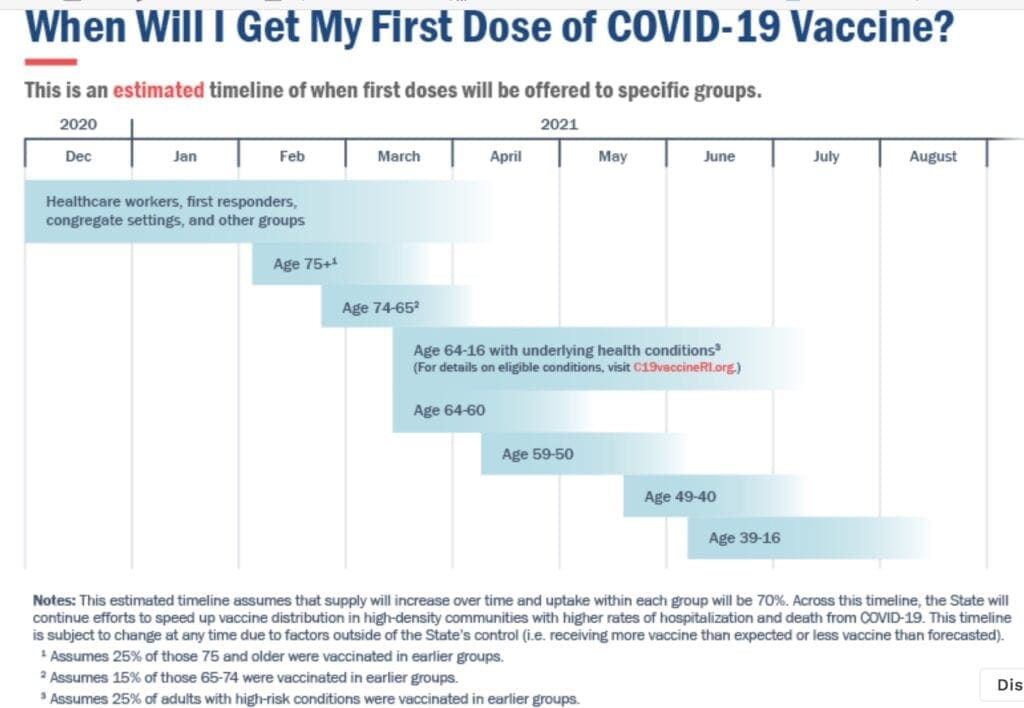Search Posts
Recent Posts
- Rhode Island Weather for June 4, 2025 – Jack Donnelly June 4, 2025
- Sour Grapes time! – Tim Jones (meet Tim at AnimeCon) June 4, 2025
- Lawsuit filed to stop Empire Wind Project by 4 environmental groups and fishermen June 4, 2025
- It is what it is: 6.4.25 – Jen Brien June 4, 2025
- New ALS treatment by PathMaker Neurosystems. Co. funded by RI Life Sciences Hub to come to RI. June 3, 2025
Categories
Subscribe!
Thanks for subscribing! Please check your email for further instructions.

Plans Announced for Next Phase of RI COVID-19 Vaccinations
This was released by the RI Dept. of Health this afternoon:
Aims to reopen economy as quickly as possible by reaching those most at risk of hospitalization and death
The Rhode Island Department of Health (RIDOH) announced a plan today for the next phase of the State’s COVID-19 vaccination campaign. The plan incorporates national public health guidance and local advisory committee input, making vaccine available to Rhode Islanders over the coming months based on age, geography, and health status.
“The approach we are taking for the next phase of the vaccination campaign is firmly grounded in the science and the data on how to use our currently limited vaccine supply to prevent the most hospitalizations, to prevent the most deaths, and to get the economy fully open again as quickly as possible,” said Nicole Alexander-Scott, MD, MPH. “We want to get as many people as possible vaccinated as quickly as possible. But without enough vaccine to vaccinate all eligible people right away, we have to be extremely targeted and strategic in our approach.”
This next phase of the vaccination campaign will likely begin in mid-February, depending on general vaccine availability. At that point, access to vaccine will depend on three factors:
- Age: When the next phase of the vaccination campaign begins, Rhode Islanders who are 65 to 74 years of age will be able to begin making appointments to get vaccinated. (Older adults in congregate settings and people who are 75 years of age and older will have already had access to vaccine.) It will take some time for everyone in this group to schedule appointments and get vaccinated. Age will continue to be the primary consideration as more people become eligible for vaccine. As more vaccine becomes available, people will become eligible for vaccine in the following order: 60 to 64 years old, 50 to 59 years old, 40 to 49 years old, 39 to 16 years old. There will be some overlap in the vaccination of each age group as additional vaccine becomes available. (A link to a tentative timeline based on current vaccine allocations is available online.)
- High-risk conditions: People who are 16 to 64 years of age who have certain underlying health conditions that put them at increased risk for severe illness from COVID-19 will have access to vaccine. These conditions fall into the general categories of kidney disease, heart disease, diabetes, lung disease, and those who are immunocompromised. People with underlying health conditions in one of these five categories will be able to be vaccinated at the same time that vaccinating starts for 60 to 64-year-olds. Additional information, including definitions of these underlying health conditions, is available at online.
- Geography: The residents of certain communities are at elevated risk for COVID-19-associated hospitalizations and deaths. Due to this disparity and given that minimizing COVID-19-associated hospitalizations is critical to Rhode Island’s ability to manage the pandemic and reopen the economy, vaccine distribution will continue in these communities. They include Central Falls and parts of Pawtucket, Providence, North Providence, and Cranston.
This approach to the next phase of the vaccination campaign was developed in consultation with Rhode Island’s COVID-19 Vaccine Subcommittee and was informed by national recommendations, community input, and a careful review of Rhode Island data on hospitalizations, deaths, case rates, and chronic conditions.
For the next portion of the vaccination campaign, vaccine will likely be available in a variety of locations, including community clinics, housing sites, and pharmacies. More information about where vaccine will be available will be announced in the coming weeks, as will information about how to register to be vaccinated. Accessibility will be a priority, both in the venues where vaccine is available and in how people will be able to register to be vaccinated.
“We wish we could vaccinate many more people, but for now, we must put out the fire where it is burning the most intensely,” said Pablo Rodriguez, MD, physician and COVID-19 Vaccine Subcommittee member. “Our problem is not one of prioritization, it is one of supply. Science and data are guiding the COVID-19 Vaccine Subcommittee and the State.”
“Given the nationally limited COVID-19 vaccine supply, I appreciate the State’s commitment to using science and Rhode Island’s specific COVID-19 infection experience to develop a vaccine delivery system,” said Elizabeth Lange, MD, Rhode Island pediatrician and COVID-19 Vaccine Subcommittee member. “We all want the pandemic to end, so no program is fast enough for everyone’s liking. I appreciate Rhode Island’s thoughtful approach given the multitude of challenges at this time.”
Focusing on age, geography, and high-risk conditions rather than occupation for this next phase of the vaccination campaign will allow the State and its partners to move quickly to vaccinate more Rhode Islanders as we receive more vaccine. This updated approach for Phase 2 will reach significant proportions of critical workers in Rhode Island. For example, approximately 58% of K-12 teachers and staff will be included in the population at increased risk of hospitalization or death due to age, health risk and geography.
While vaccination will prevent most people from developing severe illness, research is still needed to determine whether it will prevent a person from getting infected entirely and spreading COVID-19 to others. For this reason, people in critical infrastructure occupations and all Rhode Islanders will need to continue following all quarantine and isolation protocols if they are exposed to or are positive for COVID-19, and they must continue to wear masks.
The aims of the first phase of Rhode Island’s vaccination campaign were to ensure the stability of the healthcare system and to protect the residents of nursing homes and other congregate settings. The people currently being vaccinated are primarily residents in congregate settings (such as nursing homes and assisted living facilities), healthcare workers, and people in public safety. Vaccination will start for people 75 years of age and older who have not already been vaccinated in Phase 1 in early February. Adults 65 years of age and older will follow after that. To date, 86,315 doses of vaccine have been administered.
Data:
- Of Rhode Island’s COVID-19 hospitalizations, 27% have been among people who are age 70 or older. Fourteen percent of hospitalizations have been among 60 to 69-year-olds.
- Rhode Islanders age 60 and older are at the highest risk of COVID-19-associated death. Of Rhode Island’s COVID-19 associated fatalities, 59% have been among people 80 or older, 23% have been among people 70 to 79, and 12% have been among people 60 to 69.
- Rhode Islanders with kidney disease, heart disease, lung disease, and diabetes, and who are immunocompromised are more likely to be hospitalized if they have COVID-19. For example, while 10% of Rhode Islanders have diabetes, 30% of people who are hospitalized with COVID-19 have diabetes; while 4% of Rhode Islanders have heart disease, 30% of people who are hospitalized with COVID-19 have heart disease.
- Throughout the pandemic, the rates of COVID-19 hospitalizations have been consistently higher in certain Rhode Island ZIP codes compared to communities outside those ZIP codes. For example, in seven ZIP codes across Central Falls, Pawtucket, Providence, North Providence, and Cranston, the hospitalization rate in April 2020 was 201 hospitalizations per capita, compared to 34 outside those communities. In November 2020 the difference was 194 hospitalizations per capita compared to 93 hospitalizations per capita. Disparities also exist by race/ethnicity, highlighting the importance of a targeted approach that considers underlying factors in communities, such as population density, income, and healthcare access, that create higher risks for exposure, hospitalization, and death. For example, African American/Black and Latino Rhode Islanders age 35 to 44 years old have hospitalization rates that are three times higher than the rate of White Rhode Islanders age 75 to 84 years old.
Additional resources:
- Frequently Asked Questions about COVID-19 vaccine
- General information about COVID-19 vaccine
- General information about COVID-19
- Sign up for RIDOH’s weekly vaccine update


Am 78 yrs old. Instructions on how to register for vaccine not stated. Need directions of how register and place.
What city do you live in Sandra?